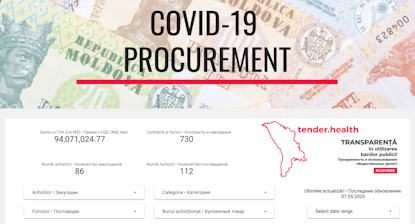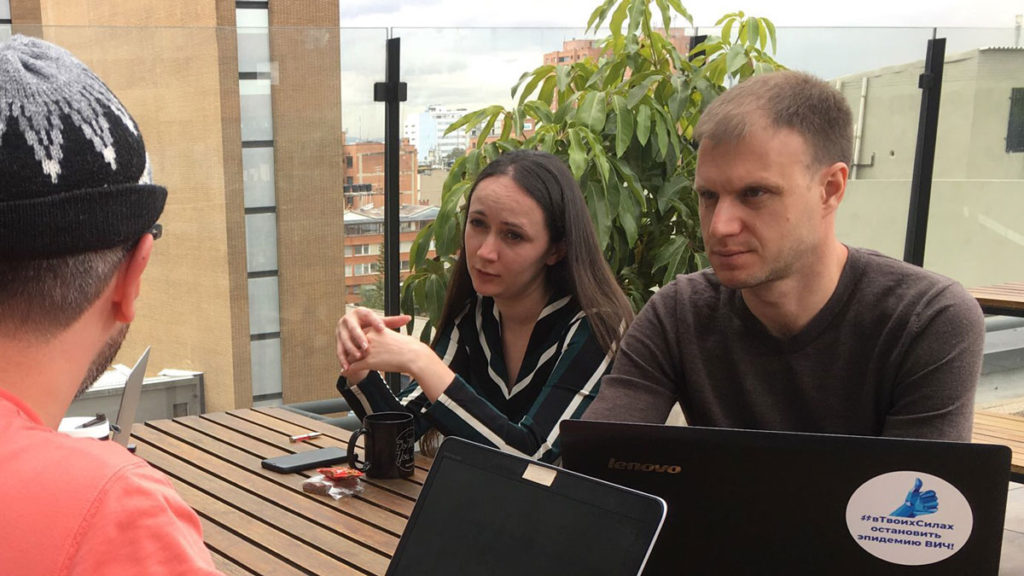Building a campaign for COVID monitoring in Moldova in 60 days

Constantin Cearanovski knows a lot about deadly health conditions. He is from Moldova, a country with some of the highest rates of HIV and tuberculosis in Europe. As a board member of Positive Initiative, the largest patients’ rights and advocacy group in Moldova, he thought he had seen it all. Then the COVID-19 global pandemic hit.
“We immediately rushed to bring together civil society organizations and the government. We knew that a fast and coordinated response would be essential to prevent the spread of the disease and make the most of our limited resources,” explains Constantin.
Thanks to the quick action by a group of civil society organizations, now a community of thirty organizations – including government ministries – regularly meet to find solutions together.
Positive Initiative is one of five groups taking part in Lift, the OCP’s impact accelerator program. When they joined the Lift program in 2019, Positive Initiative sought to improve Moldovans’ access to healthcare by lowering the price of HIV and tuberculosis medicines. As they’ve adapted to respond to the coronavirus crisis, the team credits their work with OCP and Lift over the last six months with setting them up for success. In a matter of weeks, they managed to build a public platform that displays detailed information about all the government’s contracts for supplies and services to fight COVID-19. The platform’s user-friendly dashboards are designed to reveal real-time insights that are most relevant to taxpayers and vendors, such as price comparisons, how much each health facility has spent, when items are delivered, and which companies are supplying them.
“Because of Lift, we were able to move faster. We already had a collaborative, cross-functional team in place with members from civil society and government. We were also much better equipped to start data monitoring,” says Constantin.

The tool was launched at a regular health ministry press briefing on the coronavirus situation, at which the health minister stressed the importance of constructive cooperation with civil society as the government digitizes medical procurement in Moldova.
“Thanks to this platform, transparency about the use of public money is guaranteed, increasing the government’s social responsibility and citizens’ trust in government actions,” Health Minister Viorica Dumbrăveanu said.
Developing the COVID-19 monitoring platform was not easy. All healthcare procurement in Moldova is temporarily excluded from the laws governing procurement and not recorded in the government’s official database MTender. The government also allowed hospitals to purchase COVID-19-related goods without tender and public records. Hospitals had to report to CAPCS (the central purchasing body responsible for medical procurement) on all concluded contracts. Positive Initiative had to collect data from different sources, then structure and clean it before developing their analytical tools. The OCP’s Lift program and support simplified that task, as Positive Initiative had already been working on understanding open contracting data and its use for a similar analytical tool for general health procurement data – the first of its kind in Moldova.
The team’s efforts to advance access to affordable medicines during the first phase of the Lift program also allowed them to strengthen their network and understanding of the health system. They gained the support of the Ministry of Health and other health authorities, who publicly endorsed some of the civil society group’s key recommendations and signed cooperation agreements to improve healthcare together. They researched how the government could save money, by identifying which name-brand drugs currently being procured could be replaced by lower-cost generics. They also secured funding to begin developing a country-wide stock management system, which will be an important instrument for enhancing health sector budgeting and planning.
Looking ahead, the team expects their COVID-19 procurement monitoring to provide useful insights for authorities responsible for making decisions through this complex crisis. They will also conduct training with civil society representatives, who play an important watchdog function in ensuring accountability, and push ahead with their other targets: lowering drug prices by spring 2021, building a centralized stock management system, developing draft legislation to improve procurement policies and close loopholes, and advancing their research on generic replacements for brand-name drugs.
Achieving progress on systemic reforms is tough under normal circumstances. So it’s remarkable that the Moldovans and other Lift teams have continued making progress during the COVID-19 pandemic – and even used this moment to go farther, faster. From using the crisis to making the business case for the Open Contracting Data Standard, to pushing for cross-agency monitoring and coordination, the teams have found impressive opportunities to better support their communities’ wellbeing through accelerating their reform efforts. Stay tuned as we publish more about the work of the other four teams in the coming weeks.